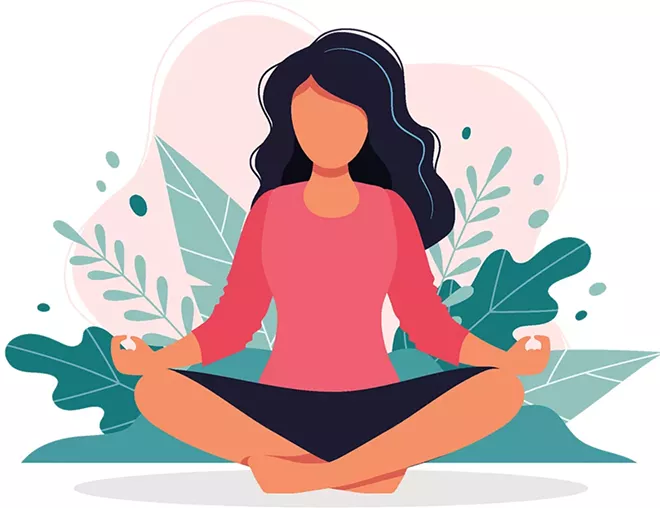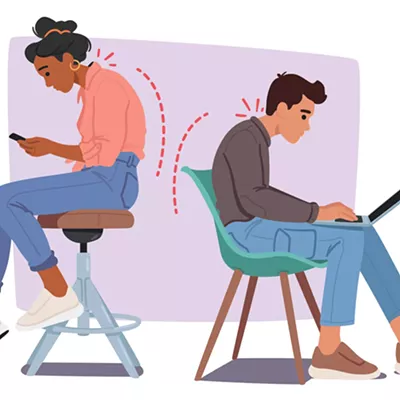Humans are emotional creatures. When a driver cuts us off on the highway, we get upset. When we've got to perform to meet expectations, we get anxious. When someone insults us, our feelings get hurt.
And while raw emotion can often get the better of us, we're not always the masters of our wandering minds, either. Ubiquitous screens, the relentless back-and-forth of digital communication and the constant buzz of electronic notifications only add to the number of potential distractions.
One increasingly popular way to restore a sense of tranquility to our daily lives is through a behavior known as mindfulness. Although that might conjure images of Buddhist monks and New Age healing crystals, mindfulness is actually an established therapeutic practice with a growing body of scientific evidence to support its benefits.
"Mindfulness is actually quite simple," says Lindsay Anne Daehlin, a clinical social worker and co-owner of Wellness Therapies in Spokane. "It's a practice of being present to whatever's happening in the moment with acceptance and self-compassion."
Those last two aspects are "critical," she adds, because they prevent us from getting caught up in judgement — even (or especially) when that judgement is directed at ourselves. Judgement usually brings emotions like shame and anger in tow. Those are powerful forces that can yank us out of the moment.
Instead, the goal is more like a detached awareness of our immediate experience and all its complexity.
Daehlin breaks mindfulness into two general categories. First, there's formal mindfulness, which means engaging in activities that ask us to focus on the here and now, such as meditation, yoga and tai chi. The second type is informal mindfulness.
"That's where you bring a mindful awareness to whatever you're doing. So if I'm washing the dishes, I'm noticing warm water on my hands, the sounds in my house. I'm noticing my breathing. I'm just in the experience, but I'm doing something else."
Informal mindfulness is more spontaneous and ongoing. As a result, less research has been conducted on its effects than those of formal mindfulness.
"We know though functional MRIs and different brain scans that the structure of the brain gets altered with practicing mindfulness. Even if you practice 20 minutes a day for eight weeks, they've noticed structural changes," says Daehlin.
To illustrate, she describes Dr. Dan Siegel's "hand" model of the brain. This model uses our fingers to represent the prefrontal cortex, which controls higher-level thinking, and our thumb to represent the primitive "fight or flight" part of the brain. Make a fist with your thumb inside, and you've got a rough idea of how the brain looks and operates.
"Mindfulness trains the brain to have that moment of pause before the emotional reaction or response. It creates actual neuro pathways between the prefrontal cortex and the limbic system, or the emotional brain. So we can see what's actually happening when people report that they're more able to stop and take a breath when they get escalated or flooded with emotion."
One of the country's foremost researchers in this regard is Dr. Judson "Jud" Brewer, director of research and innovation at Brown University's Mindfulness Center. Brewer is a psychiatrist who's used functional magnetic resonance imaging, or fMRI, to study the neural mechanisms of mindfulness with a particular focus on treating addiction and breaking bad habits.
"Our brains are set up to always be looking for rewards. They're always comparing different behaviors," he says.
"Let's say I eat some broccoli and then chocolate. My brain's going to compare those two experiences and say, 'I'll have the chocolate, please.' That's a metaphor for how we perform almost all of our behaviors and how we make decisions in life, consciously or unconsciously. And if there's a behavior that's rewarding, our brains tend to just lay those down in memory to the point where they become habitual."
As part of his work with his company MindSciences, Brewer has developed software apps that employ mindfulness techniques to counter everything from overeating and compulsive behavior in relationships to internet porn addictions. In one study on the efficacy of these app-based platforms, Brewer and his team found a 40 percent reduction in craving-related eating. Another study saw a 57 percent reduction in clinically validated anxiety scores. And in a more recent study that involved smokers who were looking to quit, they were able to predict clinical outcomes based on the levels of brain activity as a result of mindfulness training.
He does warn, however, that not all mindfulness apps are created equal. Mindfulness newbies will want to find software with a bit more legitimacy than just a mention of "science" in its description.
That's where a professional guide with experience in this field can be helpful, says Daehlin. A therapist or support group can also encourage us to stick with mindfulness training when we feel like emotion, habit and distraction will always dominate.
"A lot of people will try to practice mindfulness and say, 'I'm bad at it.' But you can't be bad at mindfulness. You can have a very busy mind. You can have discomfort and restlessness. It's when we can notice and accept that restlessness, that's what really frees us from being stuck in that emotion or frustration. And that," she says, "is the power of mindfulness."
PRACTICE APPS
Headspace
"Themed sessions" on many topics as well as "SOS exercises in case of sudden meltdowns." Free trial, then $13/month (pictured here).
Calm
Focus on mental fitness, relaxation and sleep. Free 30-day trial, then $60 annually.
Stop, Breathe
and Think
Offers "5 Minutes to Peace" for the "under 25 generation." Free trial, then $10/month ($11/month/premium).
Smiling Mind
Developed by psychologists and educators, includes programs for classrooms/workplaces. Free.
Craving to Quit!
21 day program for smoking cessation developed and tested at Yale University. Free four day trial, then $25/month
Unwinding Anxiety
Control anxiety through short daily exercises. Free four day trial, then $30/month, $140/six months.




















